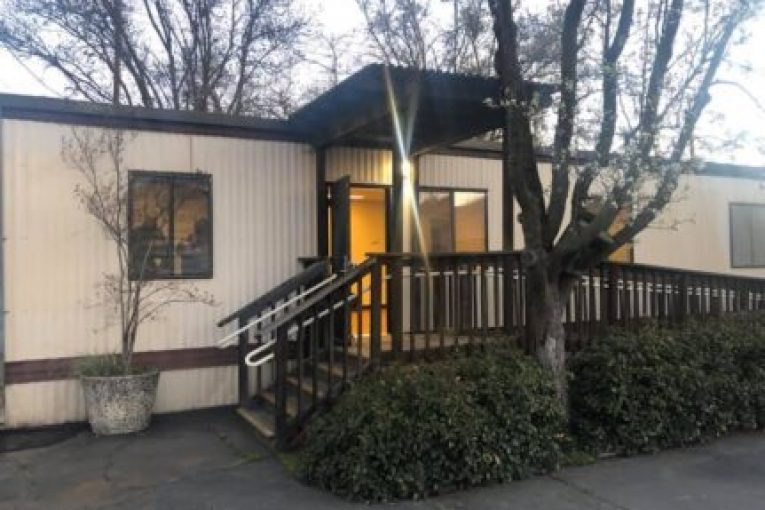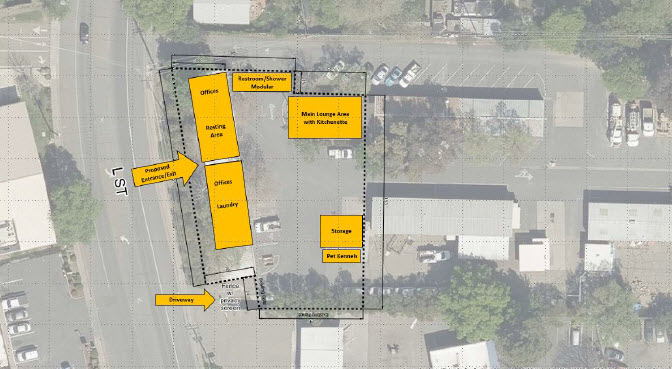

By David M. Greenwald
Executive Editor
Davis, CA -The Davis City Council created the daytime Respite Center in 2019 and then the pandemic hit. As it turned out, that time was “fortuitous,” staff determined. Providing homeless services have proven to have significant challenges, however city staff believes it is in the city’s best interest to continue the contract through June 30, 2023.
The Respite Center opened its doors on February 24, 2020, just weeks before the City declared a State of Emergency because of Covid-19.
“Through the many challenges posed by the Covid-19 pandemic, the center continues to serve as a vital part of the fight against the spread of Covid-19 infection among the homeless population and the broader community of Davis,” staff writes.
“Overall, the Respite Center has been a valuable addition to the spectrum of services available throughout the Davis community to assist unhoused individuals,” the city staff wrote in its staff report for Tuesday. “It has been fortuitous that the Center opened just as the pandemic started; our ability as a community to keep the most vulnerable members safe was greatly enhanced by having this resource.”
Staff notes that, through the Center, the community is able to provide “positive assistance to individuals” and as the new Department of Social Services becomes operational, “staff will be looking at the City’s overall homelessness strategy, which will include the Respite Center, its services, its location and its setup, in search of continuous  improvement.”
improvement.”
However, staff acknowledges, “the Center and the City’s ability to address homelessness is not without significant challenges.”
The City and CommuniCare are both “continuing to work to keep the area around the Center safe and well-kept.”
Staff is concerned, “Numerous individuals hang out around the Center but do not access services, and often engage in behaviors in the vicinity of the Center that are not appropriate and result in calls for service or increased frustrations from business and residential neighbors.”
Further, “Financing the social services provided at the Respite Center is expensive. And at the end of the day, the Respite Center does not provide overnight shelter, forcing daytime clients to fend for themselves once the Center closes.”
Staff is asking to extend the CommuniCare contract to $460,224—funding would be allocated from ARP (American Rescue Plan) money. Staff notes previously most of the costs have been funded using CARES Act funding from both Yolo County and City’s Community Development Block Grant—however “both sources were one-time dollars and have been spent.”
Staff notes, “CommuniCare is also requesting a change to the staffing configuration, which, if approved, would increase the annual CommuniCare contract to $345,168, and a 16-month contract to $460,224.
“CommuniCare is requesting to expand their staffing to accommodate needs they have identified in managing the Center by designating 1 FTE clinician dedicated to the Center,” staff explains.
Currently the Respite Center provides a variety of services to the needs of unsheltered individuals including the connection of those individuals to services.
Among these are: general service connections, health needs, veterinary needs, “The Hub”, showers and restrooms, laundry facilities, storage, relaxation, and mail.
The staff report notes “the Center has been operating under Covid-19 restrictions almost since it opened. This has posed challenges, provided opportunities and caused the Center to pivot to a Covid-focused operation within weeks of opening. It quickly became a critical part of the City’s Covid-response infrastructure, with a goal of preventing the spread of the disease among the city unsheltered individuals.”
The program also allowed CommuniCare to coordinate with Yolo County in order to identify the most vulnerable individuals to participate in Project Roomkey.
“Project Roomkey was the County’s program to house unsheltered individuals in hotel rooms throughout the County specifically for those who are medically vulnerable to Covid-19 infection and for those who need to isolate or quarantine due to positive Covid-19 test results,” staff writes.
According to the Davis Police Department there was “an increase in drug/alcohol and suspicious activity calls for service the past 12 months.”
Drug calls for service averaged about three per month, suspicious activity calls for service averaged roughly 16 per month, and violent crime calls for service averaged roughly 10 calls per month.
Staff writes, “The overwhelming majority of violent crime calls taken around the Center involve individuals known to one another, with some nexus to drugs and alcohol.”
They add, “The data across nearly all categories appear to have peaked in the third quarter of 2021, which is consistent with other areas of town due to intervening variables such as weather and available daylight hours.”
But also notable is that “this period reflects the demobilization period for Project Roomkey, which housed more than 40 homeless individuals per night for over a year. The demobilization of Project Roomkey resulted in a direct increase in traffic at and around the Respite Center.”
Furthermore, “A comparative analysis of the data prior to the Respite Center launch suggest that, in general, call volume has either decreased or remained stable. Specifically, calls regarding violent crime, nuisance, and property theft have decreased over time.”
On the other hand, staff notes, “the data fails to capture some of the larger public safety challenges related to the Respite Center and the extent to which the Police Department has worked, in collaboration with our partners, to address these issues.”
The department has had to deploy serious code enforcement efforts to address problems with visual blight due to littering and dumping. It has also needed to use “a community oriented public safety approach to address the issues of loitering around the center which has, at times, resulted in the nuisance and violence related calls for service being included in the data.”
Still, despite these challenges, the city believes that the council should extend the Respite Center another 16 months to place it on the regular two-year budget cycle.







The respite center has made that neighborhood less safe and has had the predicted impact on property crimes and blight. It has become a magnet and it’s too much traffic for one site to handle.
Council members who represent other districts now need to identify sites and direct staff to move forward with respite centers in their own districts. The burden of this impact is not being shared equally across the city. Respite centers need to be near grocery stores and transportation facilities. We need one near the shopping center on Arlington in west Davis, near Nugget or Safeway in South Davis, near Nugget in north Davis, and near the Marketplace for starters. A respite center near or on campus could also be useful.
Most of us in the vicinity of this center were willing to give it a try and to see how things went. It’s not been good for the residents and businesses nearby. The city council needs to address the safety, property crime, and blight issues and acknowledge the forbearance and patience of the neighbors, and take action to reduce those issues. Given the sheer numbers of people in need, it will require more sites to provide services and handle the policing issues that arise.
Oh goodie. I’ll let the neighborhood that ‘Crazy Corridor’ (5th Street) will continue another 16 months. Fan Freakin’ Tastic.
Yeah, like the key being “in general”. Like averaged throughout the City, not in the Old East Davis and Davis Manor adjacent neighborhoods.
Thanks for noting that. Yeah, that was my point.
Yeah, like right now, out my kitchen window, I can see the top of a blue tent, surrounded by garbage and trash, a shopping cart full of garbage crammed into the bushes along a wall, a cooking apparatus on a wood palette, and dog that comes and goes with our (as the homeless advocates insist we call them:) “neighborh” is never on a leash. I call animal control on my housed neighbors when they don’t keep their dogs on a leash, but those without a home — special treatment because no one can touch them. Thanks HALs! (Homeless advocate lawyers nationwide).
Violence related calls. There it is folks. And where? In District 3! And where are they building Paul’s place – In District 3! Hey City Council – what happened to that parallel night camping spot y’all promised another District would take — when you forged this in 2019? Have you found the district ready to take that yet? Huh? How’s that going?
The trash and debris allowed to collect outside the center is inexcusable. The loitering is inexcusable. The area feels dangerous and blighted. There are people gathering and camping day and night in front of the center and at times spread onto private property around the center. If this was any other business, it would be deemed a public nuisance. The City needs to enforce the standards it demands for others.
I will elaborate on “Crazy Corridor” (5th Street) above.
A friend lives on 5th between the Respite Center (RC) and Downtown. Since the RC opened, just before lockdown, I have been spending some social time outdoors there in view of 5th Street. Not a time goes by when some person either mentally ill or high out of their mind goes by yelling at no one in particular. It’s always different. My friend says this goes on day and night and became noticeable when the RC opened. He’s had to clean up human feces off his sidewalk twice, once after yelling at the person to stop (they didn’t).
Last weekend a guy walking by picked up a green plastic lawn chair next door and walked west on Fifth Street with the chair, yelling at no one, then into Fifth with the chair over his head, stopping traffic. He got back on the sidewalk, walked up a block and walked back onto Fifth Street. A driver rolled down his window to ask him to get out of the street, or why he was in the street or something, and they guy shoved the legs of the chair into the cars window. The driver got out and the guy with the chair ran away, and me and driver pursued him and followed him until police arrived. He was taken to jail. Police said they knew about him. Epilogue: my friend saw the same guy walking down F Street the next day.
Seemed a dangerous person to himself and others which is why we pursued him, but if he’s released in one day, why bother? Surely as a society we have gone mad.
Alan M
What are your proposed solutions? Note that that 5th and 6th Amendments prohibit incarceration or forced housing, and we can’t create a crime for not earning enough income or being mentally ill. Yes, we need to solve these problems and Don S. is right these centers need to be dispersed and relocated. We know about the complaints–its viable solutions we’re looking for .
You’re the one suggesting this. As such, perhaps you should answer the question you ask of others:
Where?
And, how much would it cost, and who would pay for it?
Somehow if these centers are moved and dispersed the problem will magically go away.
Does anyone really believe that?
Only if they’re “dispersed” to the middle of the Mojave desert, with forced relocation and retention in effect.
(By “problem”, I assume you’re referring to the problem they create for OTHERS, not themselves.)
I’m the one suggesting it. I appreciate the support and hope council members are reading these comments.
Where: near existing shopping centers.
How much: staff will have to answer that question. Costs of new, smaller respite centers elsewhere would need to be compared with existing cost for the one respite center, as well as current enforcement costs.
Who would pay for it: those of us who pay taxes locally, presumably, as well as possibly grant funding for housing and social services. Some would likely be shared costs with the county.
Keith:
I don’t know anyone who has said that or who believes it.
You don’t think that the stores would object? Or, their customers?
Maybe put one in the Nugget parking lot?
Seems to me that the declining 8th Street mall already has a significant population of homeless people hanging around at times. And it’s not helping that mall.
Actually, there’s also an ongoing presence just outside of Co-Op, as well.
Anywhere a respite center is proposed, there will be objections, just as there were for the one in east Davis. There would need to be significant community outreach.
It all sounds like it’s just moving the problem from one place to another or in the case of several dispersed centers the problem would be moved to many places all over town.
If you think about it, the respite center takes an existing problem, moves it to a specific location and attempts to improve it somewhat through resources and services. It’s not a complete fix, because there is no wrap around services or night time shelter. Getting the rid of respite center may move the problem, but it probably overall makes it worse.
In general, I increasingly-view “community outreach” as simply:
“Here’s what we’re going to do, regardless of whether or not you want it.
And no, the resulting problems will not be mitigated.”